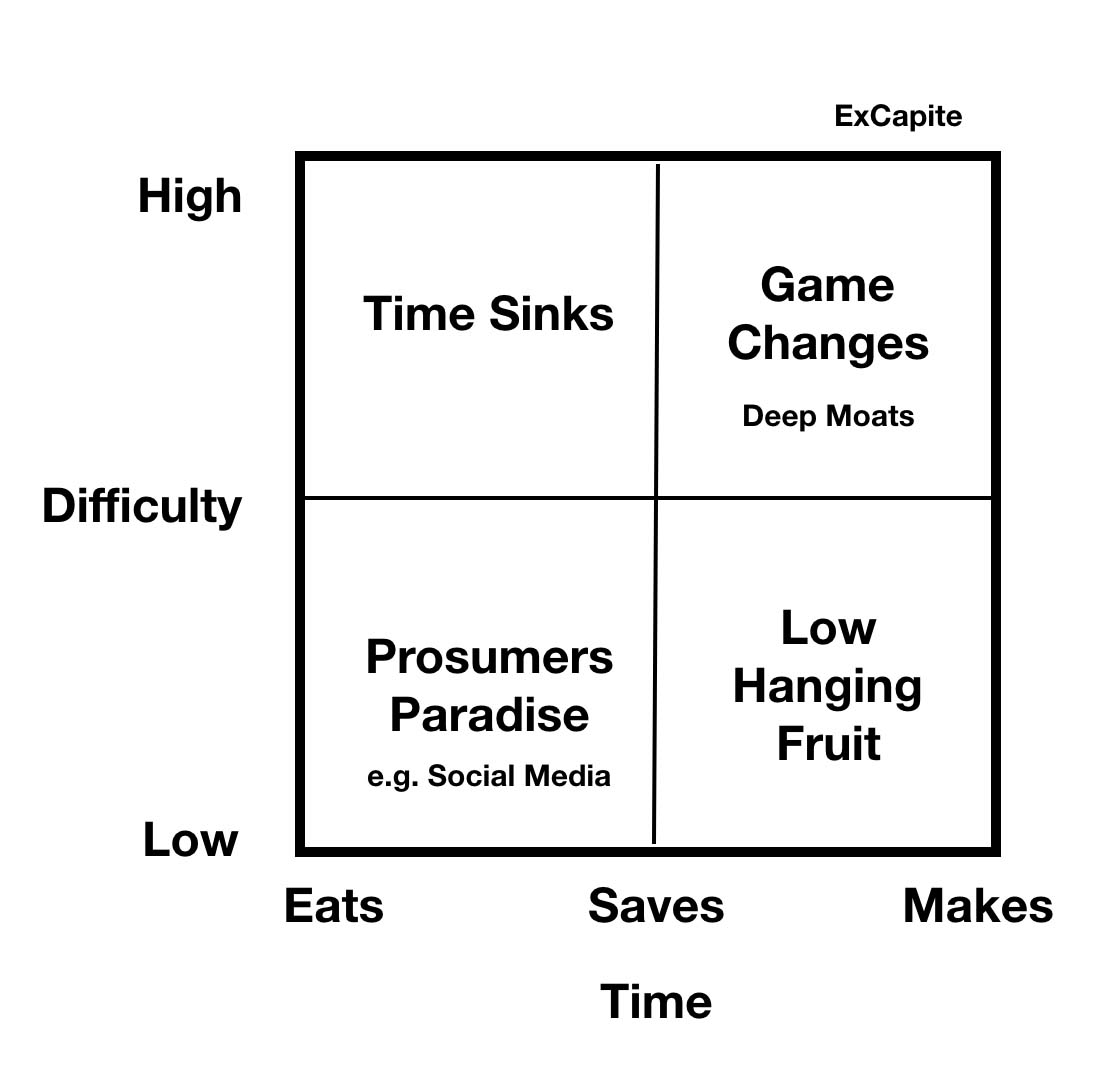Originally Published Autumn 2011 - updated Winter 2020
The ExCapite blog (circa 2009-2014) was an exploration of how our digital tools, these smartphones, are reshaping our ideas about Time, Space & Memory
The core idea was simply this:
The mobile phone was best understood as something akin to having a “Time Wallet” in your pocket or handbag.
By allowing you to communicate, with other people on the move, this device had fundamentally modified our relationship with time, space and memory.
Let me explain...
Look back over the past 200 years and you can see how the telegraph (and its later iterations, the telephone, fax, email, SMS, Whatsapp, Skype, Zoom) solved the problem of distance.
You didn't need to be in the same room with somebody to have a conversation
The IT computing industry disrupted paper by solving the stored memory problem more efficiently than books, bookshelves and libraries or photos, artworks and art galleries or ledgers and banks.
Converge telecommunications and computers and the problem you are solving is the distance between memories
You achieve this by creating networks of memories
However… and this is key…
Your ability to dominate, never mind manage or control, these networks is inversely proportional to the size of these networks.
As these networks grow they become more and more complex and difficult to monitor, manage and maintain.
Combine all these networks into an internet and the problem grows exponentially.
So the real challenge you and your competition face is the potential size of these combined networks is infinite.
You cannot manage the infinite so to survive and thrive you need to go looking for the finite variables in the equation that you can control, and
the only part of the Networked Economy that is finite is TIME.
Now to make things difficult, you need to understand, the Network is operating, and will continue to operate in the foreseeable future, in parallel with at least four distinct concepts time.
There is…
Kronos which we all know to be the beginning middle and end,
The Cyclical Time of the clock, the calendar, the seasons and the years.
Kairos. That moment of Opportunity and Synchronicity when you time the market, and
Then there is Chaos.
The winners of the Agricultural Revolution monitored and managed their world by Kronos.
The winners of the Industrial Revolution monitored and managed their world by Cyclical Time.
The winners of the Information Revolution will dominate the market with their ability to monitor and manage the Kairos moment. (Think: How TikTok’s algorithm works compared to Facebook’s Social Graph, Google’s Search Engine and Amazon’s recommendation engine)
So will the winners in the distant future dominate by monitoring and managing Chaos?
Who knows and to be honest it’s not our problem, at least not yet.
For now just accept that different parts of the network will interoperate using different perceptions of time and these perceptions of time are the true measure of just how difficult the digital transformation journey ahead will be for those operating within these constraints of how time is managed… e.g.
Operating on Kronos time are the archaic remnants of the agricultural revolution (i.e. Government, Defence and the Legal System).
Operating on Cyclical time will be the survivors of the industrial age (i.e. Schools, Hospitals and Corporations).
Operating on Kairos time will be the early adaptors of the MobCon (i.e. Teenagers and the Tech Savvy).
Operating on Chaos time will be the natural world and those lucky, gifted few who are capable of surfing on the edge of chaos.
Now these ideas about Space, Time and Memory are not new. They can be traced back to McLuhan... e.g.
“For tribal man space was the uncontrollable mystery. For technological man it is time that occupies the same role.”
- Paul Miller Dead Simple: Marshall McLuhan and the Art of the Record
This is why McLuhan is still important to us today.
His work continues to demonstrate just how important the questions we ask ourselves and of our technology are to the world we create for ourselves.
But how does this help us understand and size the digital transformation challenge?
Is there a “proof” that can help us to determine which ideas are going to be the long-term winner?
I suspect there is and I also suspect it can be discovered by employing a very simple question.
We need to ask ourselves how is this investment in change (be it cultural, technological, behavioural or whatever) is going to change the way we think about and interact with time.
and we can express this question as a Boston Box…

Clearly, the answer to the question is...
if it helps us to create time and it is difficult to replicate then it is a winner. A game changer.
If it helps us to save time then it is just delivering on the industry benchmark.
If it is going to eat time then we need to figure out how we can get our customers to do the work (i.e. waste their time, rather than ours) otherwise it becomes just another cost to the organisation
This then is the golden rule of digital transformation… it isn’t about digital technology… it’s all about transforming you, and your customer’s, relationship with time
Postscript:
Last year digital advertising vendors (think: Google, Facebook) reaped $335 Billion from organisations trying to redirect the movement of digital 'eyeballs' around the network.
In other words there is money to be made from organisations, stuck in Kronos and Cyclical time, struggling to make the shift to Karios time.
Meanwhile the Covid-19/WFH movement is on the cusp of changing the way we think about the physical spaces we gather to work, play, shop and consume.
This then is a measure of just how far we have come, and how far we have to go, in achieving the digital transformation of this global networked economy.